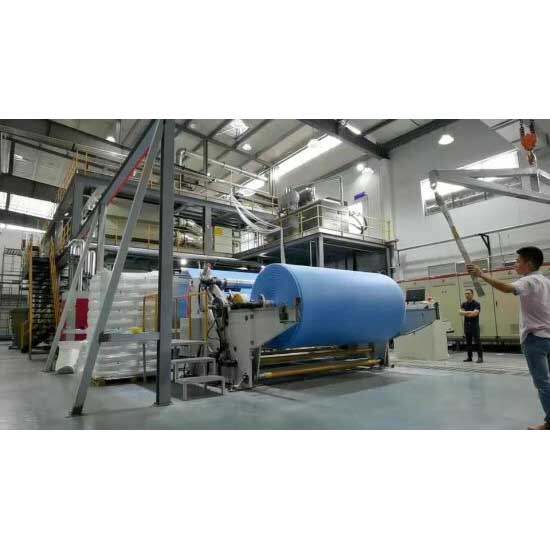6-20 个字符(仅限字母加数字)
密码不一致


Key Features to Look for in a Medical Face Mask Machine
If you’ve ever wondered how those essential medical face masks are made, you’re not alone. The process is fascinating, and it all starts with the right equipment—specifically, a medical face mask machine. Whether you’re a business owner looking to invest in one or just someone curious about how these life-saving products are manufactured, this guide will walk you through the key features to look for in a medical face mask machine. I’ll also share some personal anecdotes and fun facts to make this journey even more engaging!
What is a Medical Face Mask Machine?
Before we dive into the features, let’s start with the basics. A medical face mask machine is a specialized piece of equipment designed to produce medical-grade face masks. These machines automate the entire process, from fabric cutting and folding to ear-loop attachment and sterilization. They’re essential for meeting the high demand for masks, especially during health crises like the COVID-19 pandemic.
Did you know that the first modern medical face mask was introduced in the late 19th century? It was a far cry from the sleek, efficient machines we have today!
Why Choosing the Right Machine Matters
Not all medical face mask machines are created equal. The right machine can make the difference between producing high-quality masks that meet regulatory standards and ending up with subpar products that could put lives at risk. Here’s what to look for:
1. Production Capacity
Why It Matters:
Production capacity refers to how many masks the machine can produce in a given time frame. If you’re running a large-scale operation, you’ll need a machine with a high output.
Key Considerations:
-
Speed: Look for machines that can produce at least 50-100 masks per minute.
-
Scalability: Can the machine handle increased demand if needed?
A friend of mine runs a small medical supply business. During the pandemic, he upgraded to a high-capacity machine, and it was a game-changer. He went from producing 1,000 masks a day to over 10,000!
2. Automation Level
Why It Matters:
Automation reduces the need for manual labor, minimizes errors, and ensures consistent quality. Fully automated machines can handle everything from fabric feeding to packaging.
Key Considerations:
-
Fully vs. Semi-Automated: Fully automated machines are more expensive but offer higher efficiency.
-
Ease of Operation: Can the machine be easily operated by your staff?
Some of the latest medical face mask machines come with touchscreen interfaces, making them as easy to use as a smartphone!
3. Material Compatibility
Why It Matters:
Medical face masks are typically made from multiple layers of non-woven fabric, meltblown fabric, and nose wires. Your machine should be compatible with these materials.
Key Considerations:
-
Fabric Handling: Can the machine handle different thicknesses and types of fabric?
-
Nose Wire Integration: Does it include a nose wire insertion feature?
I once visited a mask manufacturing plant and was amazed at how seamlessly the machine handled the different layers of fabric. It was like watching a well-choreographed dance!
4. Quality Control Features
Why It Matters:
Medical face masks must meet strict quality standards to ensure they provide adequate protection. Look for machines with built-in quality control features.
Key Considerations:
-
Defect Detection: Does the machine have sensors to detect defects like misaligned layers or broken ear loops?
-
Consistency: Can it produce masks with uniform size and shape?
Some advanced machines use AI-powered cameras to inspect every mask for defects. It’s like having a quality control inspector on steroids!
5. Sterilization Capabilities
Why It Matters:
Sterilization is crucial for medical face masks to ensure they’re free from contaminants. Some machines come with built-in sterilization features.
Key Considerations:
-
UV Sterilization: Does the machine include UV sterilization modules?
-
Packaging Integration: Can it sterilize masks before they’re packaged?
During the pandemic, I bought a pack of masks that came with a note saying they were sterilized using UV light. It was reassuring to know they were extra safe!
6. Ease of Maintenance
Why It Matters:
Like any piece of machinery, a medical face mask machine requires regular maintenance to keep it running smoothly.
Key Considerations:
-
Accessibility: Are the parts easy to access for cleaning and repairs?
-
Durability: Is the machine built to withstand continuous use?
Some manufacturers offer remote maintenance services, where technicians can troubleshoot issues via video calls. Talk about high-tech!
7. Regulatory Compliance
Why It Matters:
Medical face masks must comply with regulations like ISO 13485 (for medical devices) and ASTM F2100 (for mask performance).
Key Considerations:
-
Certifications: Does the machine meet industry standards?
-
Documentation: Does the manufacturer provide compliance documentation?
A colleague once bought a machine without checking for certifications, and it turned out to be a costly mistake. Always do your homework!
8. Cost and ROI
Why It Matters:
A medical face mask machine is a significant investment, so it’s important to consider the cost and potential return on investment (ROI).
Key Considerations:
-
Upfront Cost: How much does the machine cost?
-
Operating Costs: What are the ongoing expenses for materials, maintenance, and labor?
-
ROI: How quickly can you recoup your investment?
During the pandemic, some businesses saw a return on their investment in just a few months due to the high demand for masks.
Additional Features to Consider
While the features above are essential, here are a few extras that can make your machine even better:
-
Customization Options: Can the machine produce masks in different sizes and styles?
-
Energy Efficiency: Does it consume less power, reducing operational costs?
-
Noise Level: Is it quiet enough to operate in a shared workspace?
I once toured a factory where the machines were so quiet, I could barely tell they were running. It was a stark contrast to the noisy factories I’d seen in movies!
The Future of Medical Face Mask Machines
The medical face mask industry is constantly evolving, and so are the machines that power it. Here are some trends to watch:
-
Smart Machines: Integration with IoT for real-time monitoring and data analysis.
-
Sustainability: Machines that use eco-friendly materials and processes.
-
Portability: Compact machines for small-scale or on-the-go production.
Researchers are exploring ways to make masks biodegradable, which could revolutionize the industry and reduce waste.
Final Thoughts
When choosing a medical face mask machine, it's important to focus on key features like production capacity, automation, material compatibility, and quality control. These factors will determine the quality and efficiency of the masks produced. Whether you're experienced in manufacturing or new to the industry, selecting the right equipment is crucial for making a positive impact on public health. So, next time you wear a medical face mask, remember the technology and effort that goes into making it, and consider joining the fight for global health and safety by becoming a mask manufacturer.

